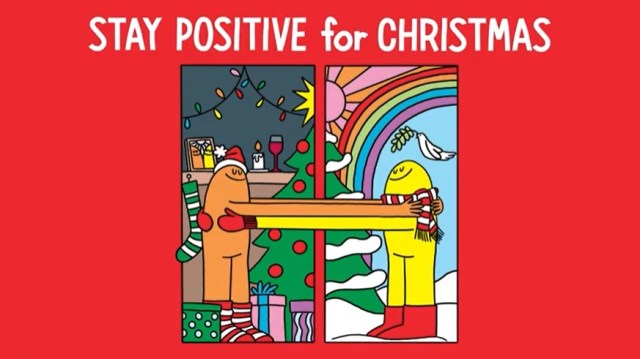
Department store chain wants to show concern for shoppers’ mental wellbeing, but some see a message of doom for their physical health.
It’s been a tough week for well-meaning department store ads in Japan. First there was Takashimaya’s attempt to promote Kyoto as a beacon of hope in these troubled times, which ended up sounding to many people like we all need to band together and stop the city’s diabolical plans.
Now comes a different ad campaign from rival department store group Seibu Sogo, whose yuletide message doesn’t seem to have hit its intended mark with all who’ve seen it. Take a look at the video below, in which Seibu Sogo suggests a number of ways to keep your spirits up during the 2020 Christmas season, and see if you can spot why it’s raising some eyebrows.
In just about any other year, the ad’s boldly proclaimed tagline, “Stay positive,” would be seen as straightforward encouragement to remember to look on the bright side of things and be thankful for all the little sources of happiness you’ve been blessed with. However, with the ad coming in the middle of a global pandemic, where many people’s inner monologues consist of bouncing back and forth between the questions “Am I/my family/my friends going to get sick?” and “Wait…are we already sick but just don’t know it yet?”, some people’s immediate interpretation of the word “positive” isn’t in the sense of “happy,” but “infected,” making it seem like Seibu Sogo is saying “Make sure that your COVID-19 infection lasts through the holidays!”
https://twitter.com/cetus03/status/1326870880773812224It’s probably not helping that the Stay Positive print poster shows two friends giving each other hugs with extremely extended arms, standing so far apart that they’re not even in the same room, visually hammering home a reminder that the coronavirus is floating around out there right before bringing up the word “positive.” Negative online reactions have included:
“Get ready for Christmas by staying infected!”
“I know I shouldn’t, but I can’t help laughing about this.”
“NOBODY noticed this?”
“We’re at the point now where advertising production companies really should have two or three people who’re really good at foreign languages on their design teams.”
“They should contract for a native speaker to check these things.”
“Should have gone with something like ‘Stay strong’ instead.”
“This is terrible, Seibu. The meaning of ‘Stay positive for Crhismas’ [sic] depends on things like the time and conditions in which it’s said.”
On the other hand, a number of commenters have no problem with the ads, instead taking them in the way that they were obviously intended.
“’Stay positive’ is a perfectly normal way to say ‘stay upbeat.’”
“I think Seibu Sogo’s ad is fine. It’s better than ‘Save the World from Kyoto,’ anyway.”
“If you hear ‘Stay positive’ and you think the only thing they could be talking about is the coronavirus, I think you’ve got something wrong with your head.”
“Come on now, let’s try to think more positively.”
In Seibu Sogo’s defense, the English word “positive,” with the corrupted pronunciation “pojitibu,” is a commonly used loanword in Japanese, and is used only in the sense of “happy/optimistic.” While there’s plenty of talk about people’s coronavirus infection status going on in Japan these days, when speaking of someone who’s tested positive for a disease, the term used is always the indigenous Japanese yousei, or alternatively kansensha (“infected person”). The use of “stay” also nudges the needle towards the “happy” interpretation of positive, since saying “stay infected” would sort of imply that being infected is mankind’s default state, which isn’t the case.
▼ Some Japanese stock image search results for pojitibu.
In any case, we’d like to take this opportunity to say we hope all of SoraNews24’s readers stay happy and healthy this holiday season — no confusion there, right?
Sources: Seibu Sogo, Twitter/@cetus03 via Jin, Twitter
Top image: YouTube/西武・そごう チャンネル
Insert image: Pakutaso (1, 2, 3) (edited by SoraNews24)
● Want to hear about SoraNews24’s latest articles as soon as they’re published? Follow us on Facebook and Twitter!
Follow Casey on Twitter, where visiting a Sogo department store food section as a teenager helped change his life.


 Pink sakura-flavored baum cake from Nenrinya looks delightfully delectable!
Pink sakura-flavored baum cake from Nenrinya looks delightfully delectable! Celebrate the New Year with a special and limited edition Barbie bento box of New Year foods
Celebrate the New Year with a special and limited edition Barbie bento box of New Year foods Supermarket sushi becomes a hot topic with foreigners on Reddit, but is it any good?
Supermarket sushi becomes a hot topic with foreigners on Reddit, but is it any good? New coronavirus cases in Tokyo drop to lowest level in almost two weeks
New coronavirus cases in Tokyo drop to lowest level in almost two weeks Tokyo plan to give 100,000 yen to residents who get infected with coronavirus sparks backlash
Tokyo plan to give 100,000 yen to residents who get infected with coronavirus sparks backlash Foreigner’s request for help in Tokyo makes us sad for the state of society
Foreigner’s request for help in Tokyo makes us sad for the state of society Japanese city loses residents’ personal data, which was on paper being transported on a windy day
Japanese city loses residents’ personal data, which was on paper being transported on a windy day Ghibli Park now selling “Grilled Frogs” from food cart in Valley of Witches
Ghibli Park now selling “Grilled Frogs” from food cart in Valley of Witches Harajuku Station’s beautiful old wooden building is set to return, with a new complex around it
Harajuku Station’s beautiful old wooden building is set to return, with a new complex around it Red light district sushi restaurant in Tokyo shows us just how wrong we were about it
Red light district sushi restaurant in Tokyo shows us just how wrong we were about it Historical figures get manga makeovers from artists of Spy x Family, My Hero Academia and more
Historical figures get manga makeovers from artists of Spy x Family, My Hero Academia and more Should you add tartar sauce to Japanese curry rice? CoCo Ichi makes diners an unusual offer
Should you add tartar sauce to Japanese curry rice? CoCo Ichi makes diners an unusual offer Akihabara pop-up shop sells goods made by Japanese prison inmates
Akihabara pop-up shop sells goods made by Japanese prison inmates Anime girl English teacher Ellen-sensei becomes VTuber/VVTUber and NFT
Anime girl English teacher Ellen-sensei becomes VTuber/VVTUber and NFT Osaka governor suggests lowering voting age to 0 to curb population decline
Osaka governor suggests lowering voting age to 0 to curb population decline McDonald’s new Happy Meals offer up cute and practical Sanrio lifestyle goods
McDonald’s new Happy Meals offer up cute and practical Sanrio lifestyle goods Japanese ramen restaurants under pressure from new yen banknotes
Japanese ramen restaurants under pressure from new yen banknotes French Fries Bread in Tokyo’s Shibuya becomes a hit on social media
French Fries Bread in Tokyo’s Shibuya becomes a hit on social media Studio Ghibli releases new action figures featuring Nausicaä of the Valley of the Wind characters
Studio Ghibli releases new action figures featuring Nausicaä of the Valley of the Wind characters New private rooms on Tokaido Shinkansen change the way we travel from Tokyo to Kyoto
New private rooms on Tokaido Shinkansen change the way we travel from Tokyo to Kyoto Tokyo Tsukiji fish market site to be redeveloped with 50,000-seat stadium, hotel, shopping center
Tokyo Tsukiji fish market site to be redeveloped with 50,000-seat stadium, hotel, shopping center All-you-can-drink Starbucks and amazing views part of Tokyo’s new 170 meter-high sky lounge
All-you-can-drink Starbucks and amazing views part of Tokyo’s new 170 meter-high sky lounge Beautiful Ghibli sealing wax kits let you create accessories and elegant letter decorations【Pics】
Beautiful Ghibli sealing wax kits let you create accessories and elegant letter decorations【Pics】 Studio Ghibli releases Kiki’s Delivery Service chocolate cake pouches in Japan
Studio Ghibli releases Kiki’s Delivery Service chocolate cake pouches in Japan New definition of “Japanese whiskey” goes into effect to prevent fakes from fooling overseas buyers
New definition of “Japanese whiskey” goes into effect to prevent fakes from fooling overseas buyers Our Japanese reporter visits Costco in the U.S., finds super American and very Japanese things
Our Japanese reporter visits Costco in the U.S., finds super American and very Japanese things Studio Ghibli unveils Mother’s Day gift set that captures the love in My Neighbour Totoro
Studio Ghibli unveils Mother’s Day gift set that captures the love in My Neighbour Totoro More foreign tourists than ever before in history visited Japan last month
More foreign tourists than ever before in history visited Japan last month New Pokémon cakes let you eat your way through Pikachu and all the Eevee evolutions
New Pokémon cakes let you eat your way through Pikachu and all the Eevee evolutions Sales of Japan’s most convenient train ticket/shopping payment cards suspended indefinitely
Sales of Japan’s most convenient train ticket/shopping payment cards suspended indefinitely Sold-out Studio Ghibli desktop humidifiers are back so Totoro can help you through the dry season
Sold-out Studio Ghibli desktop humidifiers are back so Totoro can help you through the dry season Japanese government to make first change to romanization spelling rules since the 1950s
Japanese government to make first change to romanization spelling rules since the 1950s Ghibli founders Toshio Suzuki and Hayao Miyazaki contribute to Japanese whisky Totoro label design
Ghibli founders Toshio Suzuki and Hayao Miyazaki contribute to Japanese whisky Totoro label design Doraemon found buried at sea as scene from 1993 anime becomes real life【Photos】
Doraemon found buried at sea as scene from 1993 anime becomes real life【Photos】 Tokyo’s most famous Starbucks is closed
Tokyo’s most famous Starbucks is closed One Piece characters’ nationalities revealed, but fans have mixed opinions
One Piece characters’ nationalities revealed, but fans have mixed opinions We asked a Uniqlo employee what four things we should buy and their suggestions didn’t disappoint
We asked a Uniqlo employee what four things we should buy and their suggestions didn’t disappoint Princesses, fruits, and blacksmiths: Study reveals the 30 most unusual family names in Japan
Princesses, fruits, and blacksmiths: Study reveals the 30 most unusual family names in Japan This beautiful New Year’s cake is a tasty combination of Japanese lucky symbols!
This beautiful New Year’s cake is a tasty combination of Japanese lucky symbols! Breaking: Japanese Prime Minister finally takes a day off after 148-day work streak
Breaking: Japanese Prime Minister finally takes a day off after 148-day work streak Japanese company tells worker he probably doesn’t have coronavirus, to come to work with a fever
Japanese company tells worker he probably doesn’t have coronavirus, to come to work with a fever Beautiful hydrangea pattern adds a touch of elegance to traditional Japanese fish cake
Beautiful hydrangea pattern adds a touch of elegance to traditional Japanese fish cake Japanese convenience store chain running out of fried chicken, takes precautions to save Christmas
Japanese convenience store chain running out of fried chicken, takes precautions to save Christmas “The hell with sound judgement” says Red Bull in ad, but Japanese people don’t seem to agree
“The hell with sound judgement” says Red Bull in ad, but Japanese people don’t seem to agree Could Coronavirus be helping prevent the spread of influenza? Japanese Twitter speculates
Could Coronavirus be helping prevent the spread of influenza? Japanese Twitter speculates “Do not travel to Japan” U.S. government tells citizens
“Do not travel to Japan” U.S. government tells citizens Japanese rokushigake temple architecture for your living room: The no-nail Masugumi table
Japanese rokushigake temple architecture for your living room: The no-nail Masugumi table Autonomous AI security robot spotted patrolling Tokyo train station【Photos】
Autonomous AI security robot spotted patrolling Tokyo train station【Photos】 Japanese mouthwash effective against coronavirus, according to Osaka Governor
Japanese mouthwash effective against coronavirus, according to Osaka Governor Higashi Ikebukuro 52: new Japanese idol unit made up of credit card company employees 【Video】
Higashi Ikebukuro 52: new Japanese idol unit made up of credit card company employees 【Video】 Exhibit of goldfish art by Riusuke Fukahori takes our breath away!【Pics】
Exhibit of goldfish art by Riusuke Fukahori takes our breath away!【Pics】 U.S. government lowers Japan travel warning level
U.S. government lowers Japan travel warning level Proposed Seibu Rail express train is 50s futurism meets high-speed love-aid
Proposed Seibu Rail express train is 50s futurism meets high-speed love-aid Japanese hospital threatens to stab owners of illegally parked cars with needles
Japanese hospital threatens to stab owners of illegally parked cars with needles
Leave a Reply